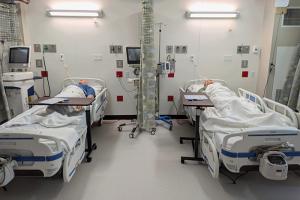When leaving docs to their own devices isnt the answer

Three years into discussing bring-your-own-device (BYOD) to work policies for physicians and staff, Henry Ford Health System (HFHS) in metro Detroit still is in its "infancy" of solving this complex issue.
It's not that the five-hospital system hasn't made progress or reaped rewards for its considerable efforts. To the contrary, a wireless medical device onboarding certification process HFHS recently enacted helped to pave the way to deploy four FDA-approved wireless radiometer ABL 90 blood gas analyzers. Two will be used in operating rooms and two will facilitate the reporting of blood gases at the bedside within 30 seconds. Data from the devices will be pushed to the clinical network so that physicians can see results almost instantly, explains Gloria Smith, respiratory therapy clinical coordinator at HFHS.
The benefits to patients — many of whom are on ventilators — are no less significant. With laboratory testing, it can take between 15 and 45 minutes or longer to get blood gas test results, Smith says.
"Now, we're able to wean the patient off the ventilator and discharge much quicker. This also gives physicians the capability to make whatever changes they need to make with IVs or the ventilator much faster," Smith adds.
The onboarding certification process is one of several major mobile technology issues HFHS has undertaken to better manage a slew of rapidly evolving technologies. In June, HFHS was slated to issue about 1,600 iPhones and several hundred iPads to physicians and residents — a move to provide a more secure environment for doctors accessing electronic health records (EHR).
All of the HFHS-issued devices have advanced encryption, and data can be wiped from them should they ever become lost or stolen, notes Doug McDonald, manager of the wireless network team. Applications in the Epic EHR platform HFHS is rolling out also support the Apple devices.
HFHS funded the device purchases as part of ongoing efforts to improve access to patient data in a secure wireless environment. It's also an attempt to deal with the chaos that results when staffers in different departments bring in various medical devices they've purchased and put them onto the organization's network, says Ali Youssef, senior
solutions architect at HFHS.
Developing a comprehensive policy and IT infrastructure to address this issue has been complicated and is a challenge for health care organizations around the country. Youssef says HFHS has invested in AirWatch, an enterprisewide mobile device management system, and an Enterasys secure Wi-FI network to provide more than 7 million square feet of continuous wireless coverage.
The Wi-Fi network aids mobility initiatives, which include supporting a variety of mobile biomedical devices, patient and visitor BYOD and the wireless infrastructure to support improved EHR access in conjunction with the massive Epic deployment. The implementation also supports HFHS requirements to provide real-time patient data at the point of care.
These IT systems not only offer benefits to staff, but they give patients and visitors ready access to their mobile phones, tablets and laptop computers and other wireless devices through the HFHS guest network. But with 24,000 HFHS employees, many of whom use the guest network, another potential challenge looms: capacity.
"A lot of people jump onto our guest access," McDonald says. "When offering guest access, it's important to have policies and procedures in place to prevent abuse by employees who may find it easier to hop on the guest network rather than the secure employee network."
Add it to the list of IT challenges Henry Ford and other health systems will have to confront as they provide greater mobile device access.




